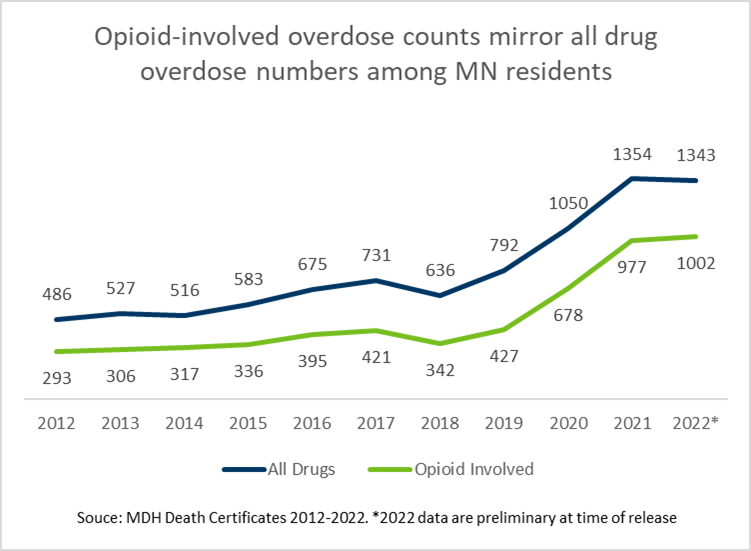News Release
Oct. 19, 2023
Overdose deaths held steady in 2022
Widespread naloxone availability is a key response to average of three deaths a day
Overdose deaths held steady from 2021 to 2022, 1,356 to 1,343, marking a plateau after several years of sharp increases, according to the Minnesota Department of Health’s (MDH) Statewide Trends in Drug Overdose: Preliminary 2022 Data Update (PDF) [LINK EXPIRED]. At the same time, the preliminary data showed fentanyl-related overdoses continued to take a tragic toll, keeping deaths at a historically high level.
Fentanyl, which is more deadly and 50 times more potent than heroin, has made Minnesota’s drug supply more dangerous. Fentanyl is now involved in 92% of all opioid-involved deaths and 62% of all overdose deaths in Minnesota, according to preliminary 2022 data. Opioid-involved deaths increased 3% (977 to 1002 deaths) from 2021 to 2022, according to preliminary data.
“We are responding to the more deadly threat of fentanyl with several new tools for saving lives that were passed by the Legislature in 2023, such as expanding the availability of naloxone, and covering the costs of having it on hand, in school buildings, treatment programs, and during emergency and law enforcement calls,” said Minnesota Commissioner of Health Dr. Brooke Cunningham.

Meanwhile, deaths involving prescribed opioids, heroin and methadone decreased. Deaths involving heroin fell to a 10-year low, decreasing 56% (103 to 45 deaths) between 2021 and 2022.
Psychostimulants (e.g., methamphetamine) and cocaine also contributed to the number of drug overdose deaths. Cocaine-involved deaths saw the largest increase of any drug category, increasing 27% (165 to 210 deaths).
Drug overdoses have a larger impact on individuals, families and communities than deaths alone. For every one drug overdose death, there were nearly 13 nonfatal drug overdoses in 2022. The number of hospital-treated nonfatal overdoses remained relatively stable, decreasing 5% from 2021 to 2022 (17,792 to 16,934 overdoses), according to the data brief.
Governor Tim Walz and Lieutenant Governor Peggy Flanagan’s 2023 One Minnesota Budget included over $200 million to address substance use and overdoses—with $50 million of that coming to MDH over the next four years. The investment addresses prevention, harm reduction, treatment and recovery. Additionally, the governor and Legislature passed a policy to reduce drug overdose deaths by requiring all schools, law enforcement officials, emergency responders and residential treatment programs to have naloxone on hand. MDH and the Minnesota Department of Education have posted a toolkit to help schools obtain cost-free naloxone and implement the new requirement.
Additional state-led activities include expanding medication-assisted treatment, establishing new peer recovery support systems and launching the MN Naloxone Portal where mandated groups can access no-cost naloxone. Collaboration with other state agencies and federal funding partners help make this overdose and substance use response work possible.
-MDH-
Media inquiries:
Andrea Ahneman
MDH Communications
andrea.ahneman@state.mn.us
